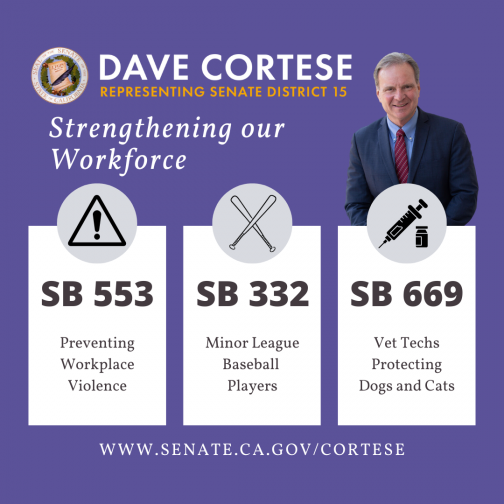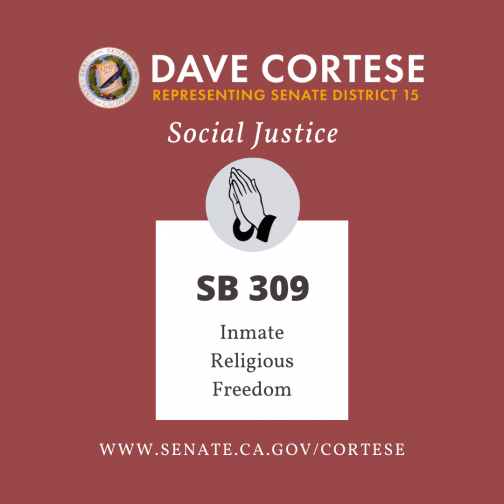Senator Cortese Newsletter: Our Bills Made it to the Governor!

The end of the legislative session is always very busy, with Senators and Assemblymembers scrambling to meet deadlines for sending bills to the Governor in service of the people of California. I’ve spent most of September jumping back and forth from committee hearings, to marathon Senate sessions, and then back to Santa Clara County every week to hear from all of you about the issues that matter most to you.
Now that we’ve finished sending bills to the Governor’s desk, I want to update you on our significant progress. Here are all my bills the legislature passed this year!






SB 10 (Melanie’s Law: Preventing Youth Fentanyl Deaths). Fentanyl is responsible for one in five youth deaths in California. In Santa Clara County, fentanyl deaths have spiked by a shocking 863% increase in recent years. SB 10 focuses on preventing youth fentanyl overdoses through prevention, response, and awareness. The bill mandates that every public school in California provide training to school employees on opioid prevention and life-saving response under a formal safety plan. Additionally, the bill establishes a state framework to ensure that all students and adults understand the growing risk of youth fentanyl exposure, and have access to the resources needed to prevent and respond to fentanyl poisoning and overdoses. Learn more here.
SB 553 (Preventing Workplace Violence) Workplace violence is on the rise. Assaults in grocery stores grew by 63 percent from 2018 to 2020, and assaults in convenience stores grew by 75 percent. Homicides in the workplace have spiked more than 20%. SB 553 requires employers to develop workplace violence prevention plans as part of existing injury prevention plans required by Cal/OSHA. Learn more here.
SB 740 (Strengthening Workforce in Green Industries) SB 740 aims to safeguard communities from industrial accidents while also creating good-paying jobs in sustainable industries. The bill extends the requirements for a skilled and trained workforce to emerging green sectors such as hydrogen, carbon capture, and biofuels. It guarantees that California’s green jobs will be lucrative, career professions that fight climate change and keep our communities safe. Read more here.
SB 150 (Growing Quality Jobs in Infrastructure Programs / Signed into Law!) The Biden-Harris Administration has approved federal infrastructure programs, allocating $752 billion for roads, bridges, and railways, along with backing for clean water, high-speed internet, green industries, and semiconductor research. However, the workforce for executing these programs remains uncertain. SB 150 aims to enhance California's job training, community benefits, and job standards in both state and federal programs. This bill will help ensure that federal investments are delivered on time and on budget. Learn more here.
SB 745 (Water Efficient Buildings) The hotter and drier conditions caused by climate change are expected to decrease water supplies in California by up to 10% by 2040. To address this challenge, California must adapt by reducing the amount of drinkable water that new buildings use for non-drinking purposes. This bill instructs the California Building Standards Commission to create new standards that reduce the water demand of new buildings. Learn more here.
SB 69 (Environmental Report Transparency) The public depends on accessing notices related to the California Environmental Quality Act (CEQA) to learn about the environmental impacts of particular development projects, and to provide their input. SB 69 mandates that all CEQA notices be published on the State Clearinghouse website, making them easily accessible to the public in one centralized location. Learn more here.
SB 642: (Protecting Communities from Hazardous Waste / Signed into Law!) In counties where district attorneys have limited resources and heavy criminal caseloads, they sometimes lack the resources to enforce hazardous waste violations. To help, SB 642 gives county counsels full authority to enforce civil penalties for hazardous waste violations. This bill builds on the work of my father, Assemblyman Dominic Cortese, who created the ‘Cortese List’ that took inventory of hazardous sites across California.
SB 406 (Speeding up Housing Production / Signed into Law!) In California, we are working to accelerate the construction of affordable homes to address the housing crisis. Under current state law, housing plans must go through an evaluation of their environmental impact under the California Environmental Quality Act (CEQA). If the project receives funding from the city or county, it often needs to undergo a redundant second CEQA review. This unnecessary double-review process results in delays and increased costs for the project. SB 406 aims to eliminate repetitive CEQA reviews while upholding California's robust environmental safeguards. Learn more here.
SB 41 (Affirming Rights for Flight Attendants / Signed into Law!) The issue of meal and rest breaks for flight attendants has long been contentious. California law mandates that employees must be "off duty" during breaks and able to leave the workplace, but this is impossible for flight attendants flying on planes. Meanwhile, the FAA requires flight attendants to remain "on duty" during flights, including breaks. SB 41, a collaborative effort between airlines and employees, allows flight attendants to negotiate meal and rest break benefits while ensuring compliance with California law. Learn more here.
SB 132 (Worker Safety on Motion Picture Productions / Signed into Law!) In 2021, Cinematographer Halyna Hutchins tragically lost her life from a gunshot wound on the 'Rust' film set. This tragedy highlighted the absence of state safety standards across motion picture productions. The bipartisan SB 132 (formerly SB 735) establishes the nation’s first safety protocols in law for television and film workers. Learn more here.
SB 309 (Inmate Religious Freedom) California receives many prisoner complaints about the freedom to practice their religion without discrimination. Research also shows that inmates who practice their religion while in detention are less likely to be violent or engage in other harmful behaviors. SB 309 aims to establish clear rules allowing religious clothing, headwear, and grooming for individuals being booked into prison or jail. Learn more here.
SB 669 (Protecting Dogs and Cats) Rising competition for veterinarians has caused nonprofits across California to scale down or shut down their low-cost or free vaccine clinics. SB 669 will allow veterinary technicians to take on some duties of regular veterinarians when a licensed vet gives permission. This bill will lower consumer costs and raise access to veterinary care. Learn more here.
SB 432 (Protecting Retired Teachers) Mistakes made by the California State Teachers’ Retirement System (CalSTRS) can put retired teachers' retirement at risk. For instance, if CalSTRS identifies an overpayment it is responsible for, a retired teacher might face a penalty, reducing their monthly benefits. SB 432 ensures that retired teachers will be informed about these errors, and the bill shields their monthly retirement payments from penalties when the mistake is not their fault. Learn more here.
SB 433 (Due Process Rights for Classified School Staff) SB 433 aims to safeguard the rights of these school employees, like school bus drivers and custodians, by allowing them to appeal disciplinary decisions to a neutral third-party officer, granting classified school staff the same due process rights as most other public sector employees, including teachers. Learn more here.
SB 332 (Minor League Baseball Players) For more than a century, minor league baseball players have worked without a union, which has resulted in lower player wages and limited benefits. SB 332 reflects months of negotiations and an agreement between minor league baseball players and Major League Baseball. It enables in California law a groundbreaking collective bargaining agreement for minor league baseball, ensuring improved wages and benefits for California's 362 minor league players. This includes provisions for housing, healthcare, and compensation during the regular season, spring training, and the off-season. Learn more here.
Don't hesitate to get in touch with my office with any questions, concerns or general feedback at senator.cortese@sen.ca.gov. We love hearing from you and are always available to help.
Thank you!
 |
Senator Dave Cortese